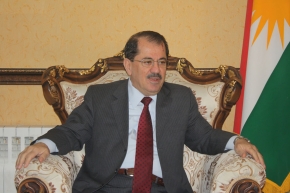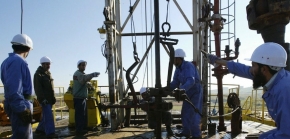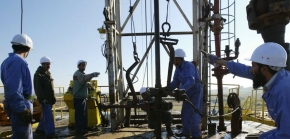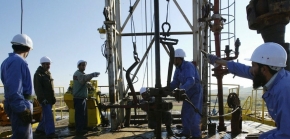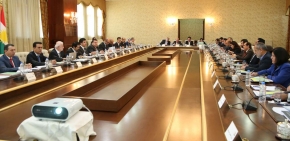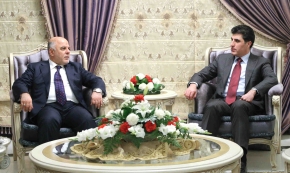Nazem Dabbagh the representative of Kurdistan Region in Iran while stating that the consulting between Oil Ministry’s advisor of Iran and the authorities of KRG is supposed to be continued informed Rostam ghasemi’s trip to Kurdistan Region of Iraq.
Reported by the reporter of international group of Ana News Agency, Nazem Dabbagh, pointing Tehran’s and Erbil’s tendency to establish relations in the field of oil and gas, reported announced that Rostam Ghassemi on the behalf of Iran has been selected to carry out the negotiation of signing a contact relating to gas export. Talking with Ana News Agency he said the reporter: Rostam Ghasemi the advisor of oil ministry of Iran is supposed to travel to Kurdistan Region to consult how to exchange gas between two sides and signing some contracts. Dabbagh pointed: this trip is taken to continue the negotiations between Kurdistan Region and I.R. of Iran to develop economic relation and Ghasemi is visiting and talking to the prime minister of KRG as staying in Erbil.
In a response to a question that any contracts have signed between Iran and Kurdistan Region, He said: no contract has been signed as of a yet, but the professional meeting is ongoing so that it can be expected that a contract get signed.
Erbil, Kurdistan Region, Iraq (cabinet.gov.krd) - In August, direct oil export from Kurdistan Region continued despite sabotage and attempted theft on the export pipeline inside Turkey borders, which occurred on 27 July and extended to the first week of August.
According to the Kurdistan Regional Government, KRG, Ministry of Natural Resources Oil Export Report, in August Kurdistan Region has exported 14,657,798 barrels of crude oil, an average of 472,832 bpd, through the Kurdistan pipeline network to the port of Ceyhan in Turkey. This is an 8.5 per cent decline comparing to 16,019,090 barrels which were exported in July.
The decline, according to the report, was due to nine days of downtime for the export pipeline which mostly occurred at the beginning of the month.
Of the exported amount, fields operated by the KRG contributed 10,958,817 barrels, an average of 353,510 bpd, while fields operated by the North Oil Company, NOC, contributed 3,698,981 barrels, an average of 119,322 bpd.
In August, the Kurdistan Regional Government delivered a total of 1,579,004 barrels, an average of 50,936 bpd, to the Iraqi State Oil Marketing Company, SOMO.
The monthly export report said that in August, the KRG “continued its direct oil sales in Ceyhan to compensate the Region for the budget shortfalls from the federal government in Baghdad and to continue to pay down debts accumulated in 2014 from pre-payments for direct oil sales” the report highlighted.”
Last week, KRG Ministry of Natural Resources confirmed that the Kurdistan Regional Council for Oil and Gas Affairs expects the first tranche of regular payments to the producing IOCs to be made available during the first half of September 2015.
In an earlier statement by KRG ministry of Natural Resources it was urged that as oil export is expected to rise in early 2016, the KRG envisages making additional revenue available to the IOCs to enable them to begin to catch up on the past receivables due under their production sharing contracts.
Erbil, Kurdistan Region, Iraq (cabinet.gov.krd) – Oil exports from the Kurdistan Region dropped during July due to sabotage of the pipeline through Turkey.
According to the monthly Kurdistan Regional Government, KRG, oil export report for July, 16,019,090 barrels of crude oil (average 516,745 bpd) were exported through the pipeline through Turkey. This is a 6.5 per cent decline over June when the KRG exported 17,130,639 barrels (average 571,021 bpd).
In an earlier statement, the KRG Ministry of Natural Resources said that since 27 July “there have been sabotage attacks and attempted thefts on the pipelines that carry crude oil from the Kurdistan Region to Ceyhan in Turkey”. According to the monthly export report, stoppage occurred “in the flow of crude oil to Ceyhan for 111 hours”.
Of the total amount of oil exported in July, fields operated by the KRG supplied 12,020,683 barrels (average 387,764 bpd) while fields operated by the North Oil Company (NOC) supplied 3,998,407 barrels (average 128,981 bpd).
Iraq’s State Oil Marketing Company, SOMO, in Ceyhan received 2,201,540 barrels (average 71,017 bpd). The KRG intended to deliver to SOMO a further two million barrels at the end of July, but was unable to do so due to the pipeline interruption.
According to the report, the KRG continued its direct oil sales in Ceyhan in July in order to compensate the Region for the budget shortfalls from the federal government and to pay debts incurred during 2014.
The KRG has, however, announced it will continue to work with its counterparts in the federal government to reach a resolution on all outstanding oil and gas issues per the joint statement of June 17, 2015 by the KRG’s Regional Council for Oil and Gas Affairs and the five political parties in the Kurdistan Regional Government.
Earlier this week, the KRG Ministry of Natural Resources announced that from September 2015 onwards, the KRG will on a monthly basis allocate a portion of the revenue from its direct crude oil sales to the producing international oil companies, IOCs. Further, with exports anticipated to increase in early 2016, the KRG envisages making additional revenue available. This is important for IOCs to maintain and increase production levels.
Erbil, Kurdistan Region, Iraq (cabinet.gov.krd/mnr.gov.krd) - Kurdistan Regional Government, KRG, has increased its direct oil sale in June due to the "significant debt backlog arising from the budget cuts of 2014 imposed by the federal government, and the need to pay down debts accumulated in 2014 from pre-payments for oil sales”, KRG Ministry of Natural Resources said in its June Export Report.
Due to these difficulties, the KRG Ministry of Natural Resources has been obliged to increase its independent oil sale, the report said.
According to the report, KRG tanks in Ceyhan port in Turkey received 17,130,639 barrels of crude oil (an average of 571,021 barrels per day, bpd) in June, through the Kurdistan pipeline network to the port of Ceyhan in Turkey.
Fields operated by the KRG contributed 12,740,711 barrels (an average of 424,690 bpd), while fields operated by the North Oil Company, NOC, contributed 4,389,928 barrels (an average of 146,331 bpd).
In June, KRG supplied 4,493,334 barrels (an average of 149,778 bpd) to Iraq’s State Oil Marketing Company, SOMO, in Ceyhan.
According to the KRG Ministry of Natural Resources Report, the KRG has indepemdently sold 11,893,231 barrels in June.
Following the budget cut imposed by Bagdad early 2014, KRG largely relied on international and local loans in securing the Region’s civil servants salaries and public services spendings.
Kurdistan Region financial difficulties continued in 2015, as the Iraqi Federal Government has, to date, failed to abide by its agreement with KRG reached last December on oil export and budgetary issues.
According to the December agreement, KRG is committed to export 550,000 bpd in return for a budget entitlement close to one billion US dollars per month to be paid by the federal government. The agreement was approved within the framework of the Iraqi Federal Budget Law for 2015.
KRG Ministry of Natural Resources June Report emphasises that, “In 2015, the difficult economic situation facing the Region has been exacerbated by the partial payments made to the KRG by the Federal Government.”
Although, KRG independent oil sales has increased, the report stresses that KRG remains committed to the 2015 Federal Budget Law in its entirety.
“[The KRG] will continue to work with its counterparts in Baghdad to reach a resolution on all the outstanding issues of oil and gas as described in the joint statement of June 17, 2015 by the KRG’s Regional Council for Oil and Gas Affairs and the five political parties in the Kurdistan Regional Government”, the report said.
In a statement issued following a joint meeting on June 17, between KRG Regional Council for Oil and Gas and the five political parties in Kurdistan Regional Government, it was stressed that, “If the Federal Government does not abide by the Federal Budget Law, the KRG will be obliged to pursue other legal solutions to settle Kurdistan Region’s financial difficulties and provide the Region’s people with security and other basic necessities in light of Law No 5 of 2013 of the Kurdistan Parliament.”
Erbil, Kurdistan Region, Iraq (cabinet.gov.krd) - According to the April 2015 report published by the Kurdistan Regional Government, KRG, Ministry of Natural Resources, KRG commitments under the 2015 Federal Budget Law have been met, and oil production has reached record levels.
According to an agreement on oil export and budget, reached last December between the KRG and the Federal Government of Iraq, Kurdistan Region is committed to export 550,000 bpd (barrels per day) in return for a budget entitlement close to one billion US dollars per month to be paid by the federal government. The agreement was approved within the framework of the Iraqi Federal Budget Law for 2015.
In April, the Kurdistan Regional Government delivered to the Iraqi State Oil Marketing Company, SOMO, a total 16,878,985 barrels for an average of 562,633 bpd.
Kurdistan Region oilfields supplied 12,457,371 barrels averaging 415,246 bpd, while North Oil Company (NOC) oilfields, Kirkuk, supplied 4,421,614 barrels averaging 147,387 bpd. Oil from both sources is exported through a KRG pipeline to the Turkish oil export facility at Ceyhan.
In March the KRG published cumulative export data, noting that while it met its oil export commitments, the KRG has yet to receive its full entitlement per agreement under the Federal Budget Law of 2015.
Last week, in two separate meetings, the Kurdistan Region Prime Minister and a number of members of the Council of Ministers, met Kurdistan Region Baghdad representatives, and the Speaker of the Kurdistan Parliament along with Parliamentary groups.
The Prime Minister reaffirmed KRG’s commitment to the December agreement and the Iraqi 2015 Federal Budget Law. He pointed out, however, that if talks with Baghdad do not produce positive results and Baghdad continues its breach of the Federal Budget Law, then the KRG will have to consider other options to stabilise the Region’s financial security.
Erbil, Kurdistan Region, Iraq, (gov.krd) – A meeting between Kurdistan Regional Government’s Oil and Gas Council and a delegation from Kurdistan Parliament was held yesterday to discuss the financial crisis in the Kurdistan Region and the pending issues between Erbil and the Federal Government of Iraq.
Kurdistan Parliament’s delegation included the Speaker, his two deputies, the heads of political parties’ parliamentary groups, head of the energy and natural resources committee and head of the economic, financial and investment parliamentary committee. The Kurdistan Regional Government’s Oil and Gas Council included KRG Prime Minister, Deputy Prime Minister, Minister of Natural Resources, Minister of Finance and Economy and Minister of Planning.
They discussed the latest developments in Kurdistan and Iraq and, focusing particularly on the budget, natural resources and ways to implement genuine reforms aimed at easing the financial crisis which the Kurdistan Region is going through.
They stressed the importance of adopting a unified Kurdish policy and stance towards Baghdad. It was agreed that the continuation of dialogue between Erbil and Baghdad was necessary and work to ensure that the Kurdistan Region receives its share from Iraq’s federal budget which was approved earlier this year by the Iraqi parliament.
They agreed on the need for increased cooperation between the Parliament of Kurdistan and the Kurdistan Regional Government particularly in adopting plans that would help easing the financial crisis. The need to undertake reforms in a number of sectors, coupled with increased transparency across all government institutions and ministries, were also discussed in the meeting.
The members of the Kurdistan Parliament delegation reiterated their support to the Kurdistan Regional Government in its efforts to establishing a road map for settling the current crisis that the Kurdistan Region passes through. It was, finally agreed that the Kurdistan Regional Government’s Ministry of Natural Resource will publish all the information related to its activities on a weekly basis on its official website, particularly those related to the amounts of oil produced and exported.
Kurdistan Region President Masoud Barzani chaired a joint meeting of the leaders of Kurdistan Region’s five main political parties and the KRG oil and gas council, which included the KRG Prime Minister and Deputy Prime Minister as well as KRG Ministers of Natural Resources and Planning.
The meeting focused on the problems facing the Kurdistan Region, particularly the fight against ISIS terrorists, and the recently-signed Erbil-Baghdad deal on oil sales and budget share of the KRG.
At the outset of the meeting, President Barzani talked about the result of his meetings with world leaders during his participation at the Munich Security Conference earlier this month. He said the whole world views the Kurdistan Region and its peshmerga forces with great admiration for standing up to the ISIS terrorists and for taking in large numbers of IDPs from other parts of Iraq.
The participants of today’s meeting issued a statement in which they paid tribute to the bravery and sacrifices of the peshmerga. They also underlined the importance of preserving Kurdish unity in the face of the current challenges facing the Region.
On the deal between Erbil and Baghdad, their statement said, “The people of Kurdistan and the regional government consider it their legitimate right, per Iraqi Constitution Articles 112 and 115 and per the 2015 Iraqi budget law, to pursue exploration and export of oil from Kurdistan. Only this will fundamentally solve the budget and payroll issues facing the people of Kurdistan. The KRG remains committed to all sections of the deal signed between Erbil and Baghdad. Baghdad must equally be committed to all section of this deal. Any technical problems can be addressed through dialogue. ”
The meeting expressed its support of the KRG and expressed its hope that the KRG would be able to resolve the budget and payroll problems.
Erbil, Kurdistan Region, Iraq, (gov.krd) – A Kurdistan Regional Government senior delegation, headed by Prime Minister Nechirvan Barzani was received in Baghdad yesterday by Iraq’s Prime Minister Haider al-Abadi and a number of Iraq’s federal government officials. The two sides held two meetings during this one day visit of the Kurdistan Region delegation to Baghdad.
The main objective of the meetings was to discuss the implementation of the agreement reached last December between the Kurdistan Regional Government and the Federal Government of Iraq on oil export and budgetary issues.
During the meeting, it became apparent that due to the financial crisis in Iraq and the lack of liquidity, the Iraqi government is unable to pay the Kurdistan Region’s share of January and February from the federal budget.
The two sides agreed to continue holding further talks in order to find an appropriate solution to the situation.
Regarding the implementation of the December agreement, the Kurdistan Regional Government delegation presented a timetable for the export of oil from the Kurdistan Region, which was accepted by the Federal Government of Iraq. Both sides reaffirmed their commitment to the agreement, while working to settle the immediate problem facing the agreement due to the financial crisis that affects whole of Iraq.
The two sides also discussed the latest developments in Iraq, the war against the Islamic State terrorist organization, ISIS, and the importance of coordination between the Peshmerga forces and the Iraqi Army in the fight against terrorism.
In his visit to Baghdad, Prime Minister Barzani was accompanied by Deputy Prime Minister, Qubad Talabani, the Chief of Staff to President of the Kurdistan Region, Dr. Fuad Hussein, Minister of Natural Resources, Ashti Hawrami, Minister of Planning, Ali Sindi, Minister of Finance and Economy, Rebaz Muhammad and KRG spokesperson, Minister Safeen Dizayee.
Latest News
- President Nechirvan Barzani in Vienna: Austria aims to enhance diplomatic and trade relations
- Kurdistan Region President meets with President of Austria
- President Nechirvan Barzani meets with Foreign Minister of Austria
- President Erdoğan reaffirms Türkiye’s continued support for Iraq and the Kurdistan Region
- President Nechirvan Barzani’s message on the 126th anniversary of Kurdish journalism
- President Nechirvan Barzani at the Sulaimani Forum: The country must bring us all together
- President Nechirvan Barzani meets with European Union Ambassador
- President Nechirvan Barzani receives French Ambassador
- President Nechirvan Barzani visits Iranian Consulate General to pay respects to victims of Kerman terrorist attack
- President Nechirvan Barzani receives outgoing French Ambassador
- President Nechirvan Barzani condemns terrorist bombings in Iran
- President Nechirvan Barzani meets with US Deputy Secretary of State
- President Nechirvan Barzani’s New Year Address
- KRG Prime Minister Meets with US Deputy Secretary of State
- KRG Prime Minister Engages in Key Talks with UNAMI Chief
- KRG Prime Minister Hosts Diplomats from Iraq and Kurdistan Region
- KRG Prime Minister Meets with the UN’s Secretary-General at COP28
- President Nechirvan Barzani meets with Turkish Ambassador
- KRG Prime Minister Welcomes UK Military Delegation
- President Nechirvan Barzani meets with UK Chief of the Defense Staff’s Senior Middle East Advisor
- KRG Prime Minister Discusses Regional Issues and Domestic Policies in Special Panel
- KRG Prime Minister Meets with Former British Prime Minister
- MEPS Forum in Duhok Highlights Climate Change Among Key Global Challenges
- KRG Prime Minister Meets with United Nations Delegation
- President Nechirvan Barzani and French Ambassador discuss the situation in Iraq and the region
- President Nechirvan Barzani meets with Head of the Independent Strategic Review of UNAMI
- KRG Prime Minister Inaugurates 5th International Trade Fair for Industry and Construction
- KRG Prime Minister Meets Qatar's Consul General
- President Nechirvan Barzani meets with Iraq’s Oil Minister
- KRG Prime Minister Welcomes Cardinal Sako of the Chaldean Catholic Church

